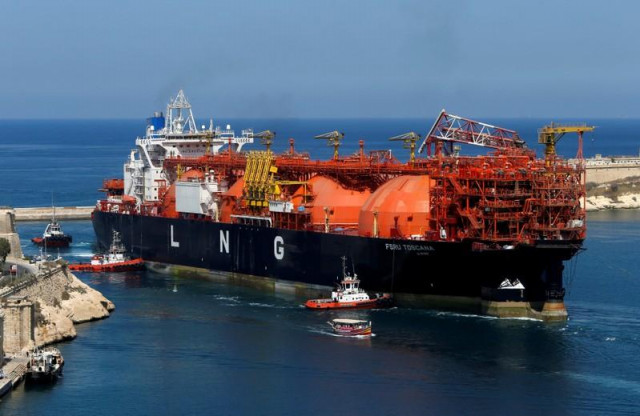PLL refuses to open commercial offers for LNG supply
Argues it cannot award contract in absence of firm LNG demand from SNGPL

Representational image. PHOTO: REUTERS
However, PLL is reluctant to open the commercial offers in the absence of firm demand from Sui Northern Gas Pipelines Limited (SNGPL) on a "take or pay" basis.
The Directorate General of Liquefied Gases of the Petroleum Division, in a letter sent to the PLL managing director, said the competent authority had decided to proceed with the opening of tender offers. "PLL is requested to take further necessary action accordingly," he said.
However in its response, PLL said it "being a separate legal entity operates under the ambit of its board of directors and is required to abide by the board's directions".
The October 9 letter of the Ministry of Energy, PLL said, was deliberated in a board of directors' meeting on October 11 and it was noted that SNGPL, being the sole buyer of PLL cargo, had failed to submit a firm LNG demand on a 10-year basis.
Therefore, it said, the board had decided not to proceed with the opening of commercial offers in that scenario.
PLL, in a letter sent to the Ministry of Energy (Petroleum Division)'s Directorate General of Liquefied Gases, said the issue was also taken up in a board meeting on October 7.
The board considered the 10-year LNG tender in the absence of any long-term demand on a take or pay basis from SNGPL as communicated by the gas utility in its letter on September 20, 2019 and considering the overdue receivables of Rs40 billion to be paid by SNGPL.
It was concluded that PLL was not in a position to award contract. Without any prospect of award, it said, the opening of commercial offers in a major international tender of around $5-6 billion may cause a substantial reputational damage to PLL as well as the LNG sector as prices offered by the bidders would be made public.
Therefore, PLL said its board resolved that the company would not proceed further with the technical evaluation and opening of commercial offers.
However, "if a firm demand for additional LNG is received from SNGPL, PLL will make its best efforts to meet such demand through a spot tender, till such a long-term demand on a take or pay basis is available".
In a letter on October 11, PLL stated that there was no firm demand for 200 million cubic feet of LNG per day (mmcfd) for a period of 10 years.
As per Public Procurement Regulatory Authority (PPRA) rules, bid prices would have to be made public. However, there was no prospect of the award of tender because of no firm long-term demand and unavailability of time to complete the PPRA bidding process as bids were valid till October 18, it said.
"The ministry's letter was written in response to PLL's letter of September 20, in which the board of directors had advised the PLL management to seek clarification from the competent authority on whether PLL should proceed with the opening of commercial offers made in the tender," said a spokesperson for the Petroleum Division.
Special Assistant to Prime Minister on Petroleum Nadeem Babar said the cabinet had issued directives for floating the tender. "Nobody will force anybody to buy LNG if not needed. Opening a tender does not mean award. Last month we opened a tender for 10 cargoes but awarded contracts for only three," he said.
"Issue is not the award. If it is not needed, it will not be ordered. But you don't do a tender, extend it and then don't open it, when there is a direction by the cabinet. You open it, you report to the cabinet and then reject it, if not needed, after informing the cabinet. Otherwise, you are ignoring the cabinet."
An SNGPL spokesperson told The Express Tribune that LNG demand would increase in the winter season but there was no demand in summer. "Back-to-back agreements should be signed by the supplier, distributor and customer," he said.
Published in The Express Tribune, October 15th, 2019.
Like Business on Facebook, follow @TribuneBiz on Twitter to stay informed and join in the conversation.





1733130350-0/Untitled-design-(76)1733130350-0-208x130.webp)











COMMENTS
Comments are moderated and generally will be posted if they are on-topic and not abusive.
For more information, please see our Comments FAQ